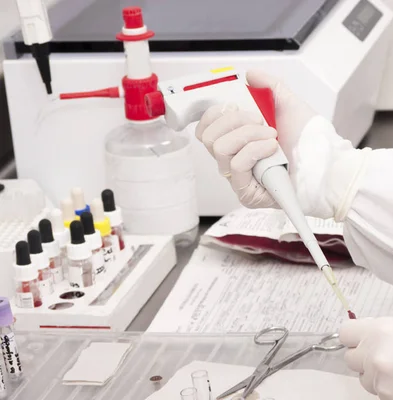
Blood Bank Laboratory Testing and
Ordering Blood Components

NOTICE:
Blood and blood components must be ordered by a Licensed Independent Practitioner (LIP) such as a physician or nurse practitioner. Transfusions should only be prescribed for a patient when the benefit of transfusion is likely to outweigh the risk. Refer to the UTMB Transfusion Guidelines for additional information.
Click here for Transfusion Services STAT Turn Around Times.
For Emergency Blood Product Usage, please click here.
-
RBC Transfusion Guidelines
Indications For Transfusing RBC's Adult and Pediatric Hemoglobin (Hgb) Concentration (g/dL) Patient Population/ Clinical < 7.0 Non-Bleeding Medical and Surgical patients, including critically ill but clinically stable ICU patients < 7.5 Patients undergoing cardiac surgery < 8.0 Patients with Acute Coronary Syndrome, Patients with hip fracture and cardiovascular disease and Hemodynamically stable patients with acute GI bleeding
-
Plasma Transfusion Guidelines
Indications For Transfusing Plasma With at least 1 of the following: Patient Population/ Clinical PT > 20 s Active Bleeding aPTT > 57 s Surgery or Invasive Procedure Specific Clotting factor deficiency < 26% of normal and no other product available Dilutional Coagulopathy (i.e. Massive Transfusion)
-
Platelet Transfusion Guidelines
Indications for Transfusing Platelets: Laboratory and Clinical Platelet Concentration (K/μL) Patient Population/ Clinical < 10 - Clinically stable non-bleeding inpatients
< 20 Inpatients
On anticoagulation prophylaxis (e.g. heparin, DOAC, etc.)
Immediately prior to low risk invasive procedures, including but not limited to:
Thoracentesis
Temporary non-tunneled venous access insertion and removal including PICC lines
Peripheral arterial line
Bone marrow biopsy
About to be discharged
Outpatients
< 50 Active bleed
Lumbar Puncture
- Immediately prior or during high-risk procedures such as those listed in JVIR guidance.
< 100 Neurosurgical patients
CNS or retinal bleed
Bleeding due to platelet dysfunction not responsive to DDAVP or Cryo (must consult Transfusion Medicine Physician)
Any Platelet dysfunction (documented aspirin)
Massive hemorrhage
-
Testing & Component STAT Turn Around Times
PRODUCT PROCEDURE PRE-REQUISITE TAT Type and Screen
Receipt of acceptable specimen; Negative Antibody Screen and No History of Antibody*
60 minutes
ABORh Confirmation
Receipt of acceptable specimen
30 minutes
Crossmatch
(Red Blood Cells)
Receipt of acceptable specimen; Complete Type and Screen with Negative Antibody Screen and No History of Antibody ** Complete 2nd ABO/Rh Confirmation
15 minutes
Crossmatch additional units
Receipt of acceptable specimen; Complete Type and Screen with Negative Antibody Screen and No History of Antibody ** Complete 2nd ABO/Rh Confirmation
15 minutes
Uncrossmatched RBCs –
O Negative
Verbal confirmation that physician will sign waiver; collection of specimen
10 minutes
Uncrossmatched RBCs –
Type Specific
Verbal confirmation that physician will sign waiver; Receipt of specimen and 2nd ABO/Rh Confirmation
10 minutes
Fresh Frozen Plasma
Blood type on record for current admission
30 minutes
If no blood type on record on current admission and receipt of acceptable specimen.
1 hour
Platelets
Blood type on record for current admission
15 minutes
If no blood type on record on current admission and receipt of acceptable specimen.
1 hour
Cryoprecipitate (pooled)
Blood type on record for current admission
15 minutes
If no blood type on record on current admission and receipt of acceptable specimen.
1 hour
*All TATs dependent on availability of blood component.
Special transfusion requirements (ex.: CMV negative, Irradiated, Hgb S negative, will lengthen TAT).
**If antibody screen in positive, TAT dependent on complexity of antibody ID.
Pre-Transfusion Testing
Correctly identifying the patient during collection of the pre-transfusion sample is vital in avoiding 'wrong blood to wrong patient' episodes.
All specimen collection and labeling must be done in accordance with the UTMB IHOP Policy 09.13.29 - Transfusion of Blood Components.
Pre-Transfusion compatibility testing prior to transfusion involves the following:
TYPE & SCREEN TESTING
- ABO/RH Identification
- Red Cell Antibody Screen to detect red cell antibodies
- For patients who have 'no red cell antibodies detected,' compatible units are selected and issued electronically.
- For patients who have 'red cell antibodies detected,' further laboratory work is required to identify the specificity of the antibody, to type the patient and donor units in order to provide specific antigen negative blood and to perform a full serological crossmatch. For patients with multiple antibodies, this work can take several hours to complete.
ABORH CONFIRMATION TESTING
- ABO/RH Confirmation
NOTE: Having a T&S ready and available for patients who may need a transfusion allows for quicker dispensing of necessary blood component when the need is determined.
FYI: If a patient is discharged or transferred from another UTMB facility, they will require a new Type and Screen collection.
Specimen Expiration:
Compatibility testing (Type and Screen sample collected to be used for transfusion) is to be repeated every 3 days, as indicated. The Type and Screen sample expires at midnight on the 3rd day after it was drawn.
- For Adults: The specimen expires at midnight 3 days after the specimen was collected. (Example, collected Tuesday, would expire Friday at 23:59).
- For Infants ≥ 4 months of age, the expiration of the compatibility specimen follows the same principle as adults.
- For Neonates < 4 months of age, the specimen expires when the infant turns 4-months of age or is discharged, whichever comes first.
FYI: If a patient is discharged or transferred from another UTMB facility, they will require a new Type and Screen collection.
Reminder: If the antibody screen is positive there will be an inherent delay to find the correct component that is compatible for the patient. The delay can range from 1-2 hours or possibly even days depending on the complexity.
Specimen Requirements:
- All requests must include requesting physician's name and ID number, patient's complete name, UH number, current account number, patient location, clinical information/diagnosis, identity of phlebotomist and verifier, and date/time of sample collection.
- The specimen must be labeled with the patient's full name and UH number. Specimens should be transported to the laboratory in a biohazard specimen bag with the request form in the pocket of the bag. All information must be complete and legible on the specimen and the requisition.
Causes for Specimen Rejection
- Not performing Positive Patient Identification (PPID)
- Not saving collection information
- Incorrect or incomplete collection information
- Incorrect or incomplete patient identifiers
- No label on tube
- Mixing Epic Beaker process with Downtime
- Wrong tube type
- Gross hemolysis
- Diluted specimen
- QNS
NOTE: If a specimen is rejected, a Blood Bank technologist will contact the nurse or physician of the rejection and need for re-collection.
Ordering Blood Components
Blood components must be ordered by an Advanced Practice Professional (APP) such as a physician or nurse practitioner. Transfusions should only be prescribed for patients when the benefit of the transfusion is likely to outweigh the risk.- For detailed information, please refer to Guidelines for Transfusion of Blood and Blood Components
- Under Useful Resources at the bottom of each page are Epic Resources for Nurses and Providers for information regarding blood product administration and ordering products
- For the APAC Surgical Blood Ordering Schedule, click here







